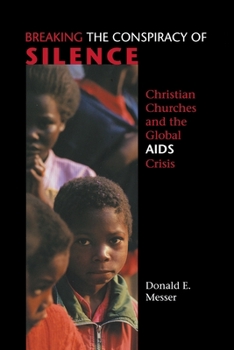Breaking the Conspiracy of Silence: Christian Churches and the Global AIDS Crisis
Select Format
Select Condition 
Book Overview
Christian Churches and the Global AIDS Crisis More than twenty years into the global AIDS pandemic, the efforts of Christian congregations and denominations have been less than minimal. This book is aimed to awaken Christian compassion in the coming years to this fathomless tragedy. The worst health crisis in the world in 700 years, global HIV/AIDS epidemic is overwhelming in scale: 40 million people are infected worldwide (75% of them in Africa); 7000 people die daily; each day 1600 persons are infected. Some 26 million people have already died. ''At this unprecedented kairos moment in human history, '' says Messer, ''God is calling the church to a new mission and ministry.'' Drawing on his own involvement in global AIDS education in Asia, Latin America, and Africa, Messer uses stories, basic factual information, and theological insights to motivate lay and clerical Christians to assume leadership and form partnerships with Christians around the world in this struggle. Just as individuals must change their behavior to prevent and eliminate AIDS, so must congregations and church leaders. Compassion, not condemnation, is desperately needed, says Messer. But financial resources for education and prevention programs are also urgently required from churches. Messer shows how churches can partner with ecumenical organizations, relief agencies, volunteer mission programs, healthcare programs, and other agencies to engage global AIDS directly and effectively.
Format:Paperback
Language:English
ISBN:0800636414
ISBN13:9780800636418
Release Date:February 2004
Publisher:Fortress Press
Length:192 Pages
Weight:0.84 lbs.
Dimensions:0.5" x 6.1" x 9.0"
Customer Reviews
2 ratings
Breaking the Conspiracy of Silence: Christian CHurches and the Global AIDS Crisis
Published by Thriftbooks.com User , 17 years ago
Are Christian Churches really "Christian" when they exclude certain groups of people from worship and other aspects of "church" life because this group does not meet certain 'qualities' or 'qualifications'?
HIV-AIDS and the Gospel
Published by Thriftbooks.com User , 18 years ago
"It is required of a person," wrote Oliver Wendell Holmes, "that he should share the passion and action of his time at peril of being judged not to have lived" (p. 69). Using Holmes' metric, and the statistics that continue to emerge about the magnitude of the global AIDS crisis, one would think that most people, and especially Christians, would be involved. But such is not the case, according to Donald Messer. True, 22 million people have died of AIDS, 40 million now live with HIV (95% of whom are in the two-thirds world), and 14 million orphans have lost parents to the disease. True, the disease is still in its infancy and by some estimates will not peak until the year 2050. True, although 95% of HIV infected people live in the two-thirds world, only about 10% of the global HIV/AIDS budget is spent there (p. 118). Even so, Messer argues, most Christians have responded with apathy, indifference, denial, denunciation and discrimination. His book wants to move us forward. In the Greek New Testament the word kairos (= "time") has a special connotation, which Robert McAfee Brown once defined as "a time of opportunity demanding a response: God offers us a new set of possibilities and we have to accept or decline" (p. xiii). The Scottish theologian George McLeod (1895-1991) may have said it best when he wrote, "I simply argue that the Cross be raised again at the center of the market place as well as on the steeple of the church. I am recovering the claim that Jesus was not crucified in a Cathedral between two candles, but on a Cross between two thieves; on the town garbage heap; on a crossroads so cosmopolitan that they had to write his title in Hebrew and in Latin and in Greek; at the kind of place where cynics talk smut and thieves curse, and soldiers gamble. Because that is where he died and that is what he died about. And that is where churchmen should be and what churchmen should be about" (p. 20).






